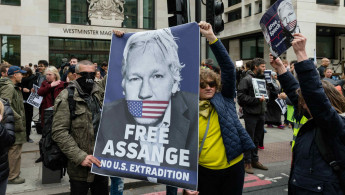UK Home Secretary Sajid Javid signs US extradition order for Julian Assange
Talking to the BBC’s Today Programme, Javid said Assange was "rightly" behind bars.
"There's an extradition request from the US that is before the courts tomorrow but yesterday I signed the extradition order and certified it and that will be going in front of the courts tomorrow," the home secretary said.
Javid's decision means the courts can now send Assange to the US, where he faces an 18-count indictment including conspiring to hack into a government computer, and soliciting and publishing secret documents.
"It is a decision ultimately for the courts, but there is a very important part of it for the home secretary and I want to see justice done at all times and we've got a legitimate extradition request, so I've signed it, but the final decision is now with the courts," Javid added.
The US Justice Department confirmed on Tuesday that it had submitted a formal extradition request.
US authorities will detail all the charges against Assange at a hearing on the extradition in London on Friday, the editor of WikiLeaks said on Tuesday.
Twitter Post
|
The 47-year-old Australian is not expected to attend Friday's hearing but could take part from prison via video link, although it will be largely procedural. Assange was too ill to attend last month's hearing at at Westminster magistrates court.
The "first real confrontation of arguments" in court will not be for several weeks or months, WikiLeaks' editor Kristinn Hrafnsson said.
On the run from extradition to Sweden on accusations of sexual assault, Assange lived inside Ecuador's embassy to London for seven years after being granted asylum.
He was arrested by British police in April after Ecuador finally withdrew his asylum and is now serving a 50-week prison sentence for violating his bail conditions.
The US has accused Assange of violating the US Espionage Act by publishing military and diplomatic files in 2010.
The 18 charges against Assange reject his claim he was simply a publisher receiving leaked material - which would be protected under press freedom legislation.
Hrafnsson said the charges were "very revealing about the nature of this entire case".
He said the Espionage Act was part of an "archaic legal framework... and has never been used against a publisher and a journalist".
"It's an indication of the watershed moment that we are now seeing in the attack on journalism," he said.
Detained at London's Belmarsh high-security prison, Assange has been transferred to a medical unit due to concerns about his health.
He received a visit on Tuesday from his father, John Shipton, and the Chinese dissident artist Ai Weiwei, the UK's Press Association reported.Agencies contributed to this report.
Follow us on Twitter: @The_NewArab





 Follow the Middle East's top stories in English at The New Arab on Google News
Follow the Middle East's top stories in English at The New Arab on Google News
![Israeli forces ordered bombed Gaza's Jabalia, ordering residents to leave [Getty]](/sites/default/files/styles/image_330x185/public/2176418030.jpeg?h=a5f2f23a&itok=_YGZaP1z)

